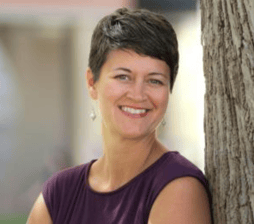In Colorado, Senate Bill 181 (SB19-181) is changing the way oil and gas development is regulated, and one of the main effects of the bill is a large shift towards increased local control over siting decisions. In a first of its kind study, the National Science Foundation (NSF) has awarded researchers in Colorado a $730,000 grant to examine the impact of the bill and whether or not shifting oil and gas decision-making to the local level will lead to fairer outcomes for marginalized communities.
Katie Dickinson, PhD, Colorado School of Public Health
“Poor communities and communities of color persistently face higher risks to their health and well-being. Recent events have shown that this is true for a wide range of risks. Some of these risks are linked to policies that affect where environmental hazards like oil and gas operations are cited,” said Katie Dickinson, PhD, assistant professor of Environmental and Occupational Health at the Colorado School of Public Health, and principal investigator in the study.
The new study conducted by the Colorado School of Public Health at the CU Anschutz Medical Campus in partnership with the University of Colorado Denver and Colorado School of Mines will look at how the bill is impacting Colorado’s towns and cities, and how its effects may differ for individuals and communities across racial and class lines.
“Disadvantaged communities are disproportionately impacted by pollution and do not have equal access to environmental goods,” Dickinson adds. “Being able to contribute to a framework for decision-making around oil and gas siting, that also takes into account a community’s social and environmental disadvantages, is key to protecting the health and wellbeing of our most vulnerable citizens.”
More specifically, the research is aimed at answering three questions:
1) Do socially disadvantaged communities tend to be closer to oil and gas development than communities that have more resources?
2) Do these disadvantaged communities have equal access to information about the risks and benefits of oil and gas development that could affect where they choose to live and if they choose to get involved politically?
3) Will increasing local government control over oil and gas siting lead to more equitable siting decisions and broader access to those decision-making activities?
“Our innovative framework examines geographical patterns of development alongside the decision-making processes that goes into oil and gas development, bridging two main areas of environmental justice research,” said Deserai Crow, PhD, associate professor at the School of Public Affairs, University of Colorado Denver, and co-principal investigator. “Our project offers methodological innovation by using multiple datasets at different spatial scales, which is especially important for rural areas where capturing proximity of people to increasingly intensive oil and gas operations has been challenging in past studies.”
To answer the first question, the researchers will analyze large geospatial datasets to assess the distribution of oil and gas impacts, triangulating between multiple datasets and analyses at different levels of spatial aggregation to evaluate how these methodological choices affect results. The second question will be addressed using a household survey in purposefully selected Colorado case study sites. To investigate the third question, the researchers will use a mixed-methods analysis of local decision maker surveys, policy documents, and in-depth interviews, focusing specifically on policy and rulemaking changes following the April 2019 passage of SB181.
“Everyone deserves equal protection from environmental risks and opportunities to participate in decision-making processes that affect local environmental and health outcomes. In Colorado, this means that communities should be meaningfully involved in decision-making around issues that affect their local environments such as oil and gas development, especially given the far-reaching economic, social and environmental impact of the industry. Our goal is to provide useful information for local communities, Colorado state-level policymakers, and national leaders who are engaged in oil and gas decision-making,” Dickinson adds.


.png)
.jpg)
